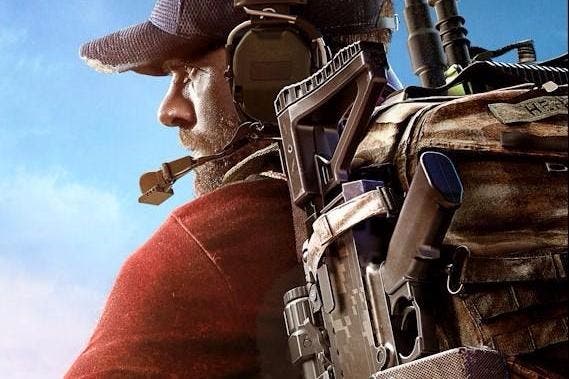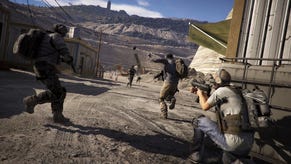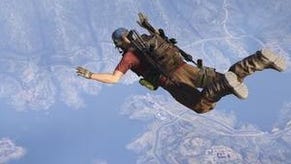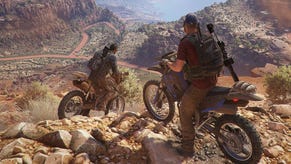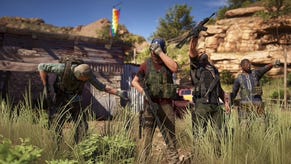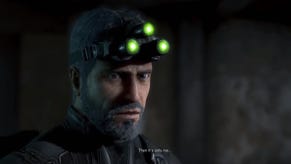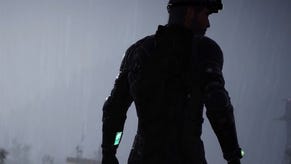Tom Clancy's Ghost Recon: Wildlands review
Cartel your friends.
Wildlands is that familiar glossy contradiction, the "gritty" quasi-realistic open world blockbuster - a work of great craft and care that's also a work of macabre war tourism, wowing you with its geography even as it casually up-sells the bankrupt fantasy of playing global policeman. Aside from being another Ubisoft love letter to icon-studded map screens, it reprises the fond Tom Clancy daydream that the answer to every festering international dilemma is a squad of all-American roughnecks armed with a list of names and a relaxed definition of collateral damage. It's a game about extrajudicial murder whose creators have taken the time to animate children playing hopscotch in schoolyards, a realm of soothing splendour in which you'll kick in the door of a village church to retrieve a laser sight accessory from the altar. It is by turns plodding and vivid, entertaining and abhorrent.
I can't quite bring myself to loathe it, but it says a lot that I keep trying to escape it - or at least, to escape the part Wildlands expects me to play in reshaping its coked-up appropriation of Bolivia (whose government has lodged a formal complaint with France over the country's depiction in the game). While crossing the landscape I typically eschew fast travel in favour of a helicopter or plane, seizing my chance to slip the surly bonds of yet another bloody mass of Ubi-brand emergent distractions - resources and gear items to gobble up like plankton, convoys to pester, patrols to waylay or be waylaid by. Up there, all you have to worry about are power lines and the impetuous handling. And the occasional surface-to-air missile.
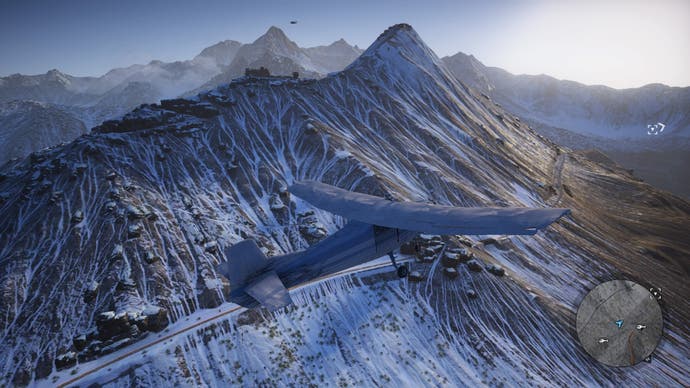
On reaching the majestic salt flats that extend beyond the world's northwestern perimeter, I immediately leapt aboard a nearby dirtbike and roared off towards the horizon - hoping to break free of both the game's effective but desperately routine activity design and the Clancy franchise's moribund obsession with grizzled wetworkers changing the fates of nations by knifing anybody with a funny accent. Perhaps there is something outside of all this, I thought. Perhaps it'll be like that scene at the end of the Matrix 2 - a burst of radiance, a room walled with television screens and a chair swivelling to reveal the avuncular figure of Yves Guillemot, there to explain the Ubiworld's ultimate purpose. Alas, I was rewarded only with a loading break and a trip back to the nearest campsite, where I spent five minutes painting a rifle pink, tossed a grenade at a passing minibus, then climbed into my chopper and smashed it repeatedly into the ground.
Ghost Recon: Wildlands' premise reads like a 5am Trump tweet: Bolivia has been overrun by a fictitious Mexican drugs cartel, the dastardly Santa Blanca, and it's your job as leader of a four-person Ghost squad to pick off the senior players, one by one - working your way up from regional kingpins through caricatured lieutenants to the organisation's mournful overlord, El Sueño. This translates to scouring each district for intel to unlock nearby missions, completion of which triggers an encounter with the local bigwig. Take out four regional bosses and you'll be able to have a crack at an underboss, then one of El Sueño's lieutenants, and finally the top dog himself - a procession of bloody takedowns that makes a mockery of the concept of a surgical intervention.
In between carrying out story objectives, you can pootle around in search of new weapons, accessories and skill points to bestow on a slimmed-down upgrades tree, or conduct a range of relatively simple escort, area defence and objective capture missions on behalf of Bolivia's initially toothless rebels. Bolstering the latter confers a range of support abilities - vehicle and ammo deliveries, mortar strikes, a pop-up detachment of guerrilla fighters - besides increasing the number of allied troops passively roaming the neighbourhood.
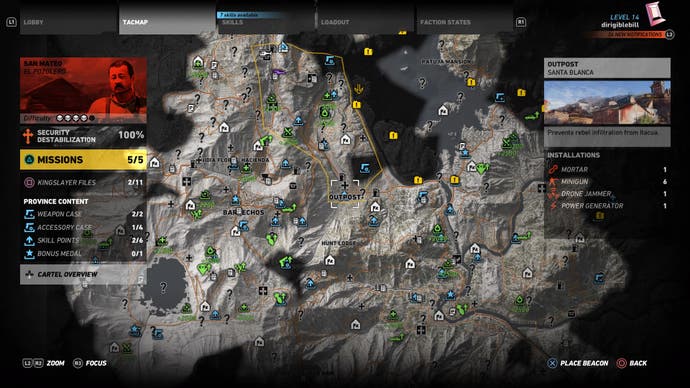
Save for a couple of structural tweaks - there are no radio masts, thank the maker, and you're given a choice as to what kind of side-mission or collectible you want to flag up when you scan a document or interrogate a VIP - it's business as usual for an Ubiworld, and soon becomes monotonous. But as superficial as it may sound, the vistas are some reprieve. Where the likes of Horizon: Zero Dawn dazzle at a glance, Wildlands offers up a quieter kind of beauty, made up of exquisite regional variations and carefully layered effects - the way a summer thunderstorm blackens one half of the sky even as sunlight bronzes the road underfoot, the flamingos that shoot up as you swoop low over a lake's surface, or the spectral blue of a snowfield in the shadow of a peak. However compressed and selective in its recreation of the country's human and physical geography, this is a portrayal that deserved better than to be reduced to another map-full of things to kill, collect or conquer.
The backbone of the game's mission design is our old friend the fortified outpost, a publisher staple since the days of Far Cry 3. Outposts come in all shapes and sizes, from humble roadside checkpoints through clifftop communications arrays to rusty prisons squirrelled away in canyons, but each boils down to a familiar, dependable clutch of combat props and hazards.
There are mounted guns and mortars, lookout towers that always boast a sniper or two, alarms you can trash to stop the residents summoning reinforcements, lights you can either blow out or disable by shutting off a generator, captives you can free to even the odds and, of course, a multitude of things that explode when shot. Whatever the precise contents of each base, the player's tactics are broadly identical - mark everything on the HUD using either your binoculars, a rifle scope or your trusty quadrotor drone, then work your way through the opposition as efficiently and discreetly as you can, cutting down sentries with synchronised sniper shots (Ghost Recon's signature trick) before moving inside the walls to mine chokepoints and stuff all the vehicles full of C4.
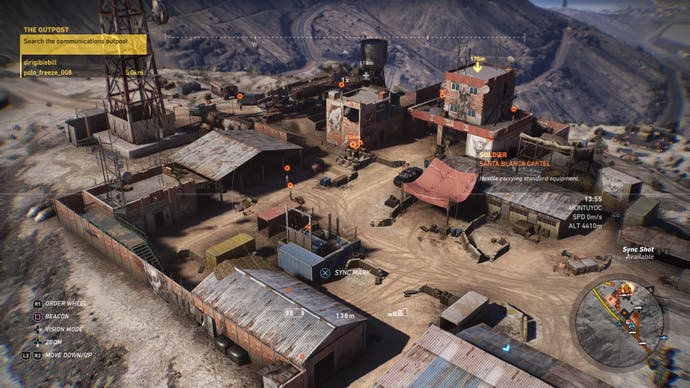
It's still an engaging balance of predictability and chaos, an endlessly varied stealth puzzle that boils over naturally and elegantly into a firefight, but if you've played a Far Cry game since the third you'll have seen everything Wildlands has to offer here a hundred times over. The missions are also a little rough around the edges in places - you can expect the odd frustrating stealth escapade which fails you when you're detected, made all the more unbearable by a mystifying shortage of mid-mission checkpoints. The controls are a bit shonky, too - the command wheel on right bumper is a chore to manipulate, and the game's context-sensitive cover mechanic is annoyingly floaty, never quite managing the feel of slamming your shoulder to a wall under fire.
In theory the Ghosts themselves, consummate infiltrators overshadowed by the antics of their Rainbow Six rivals, are well-placed to add a few layers to these concepts. In practice, this is less a Ghost Recon game than one haunted (sorry) by Ghost Recon, in which Advanced Warfighter's taut teamplay struggles to assert itself against a world bubbling with trivial pop-up activities and a tidal wave of customisable tat. The character editor sums up this clash between epochs - in addition to choosing and tinkering with your guns as in other tactical sims, you'll be scratching your head over whether the tinted lenses you've taken a shine to match your stonewashed jeans, or whether that eagle tattoo is OTT when paired with a 10-gallon hat.
As charmingly goofy as the bling can be, the arsenal beneath is quite pedestrian - sniper rifles, assault rifles, submachine guns, light machine guns, pistols and shotguns, most bristling with customisation slots for new stocks, barrels, scopes and the like, plus a handful of grenade types and tactical vision modes. There's a gentle satisfaction to derive from tweaking each weapon's stats, and higher difficulty settings put more pressure on you to eke out the desired balance of recoil, accuracy, range and damage, but much of the time, as long as you have at least one silenced scoped rifle to hand you can more or less forget about the rest of it.
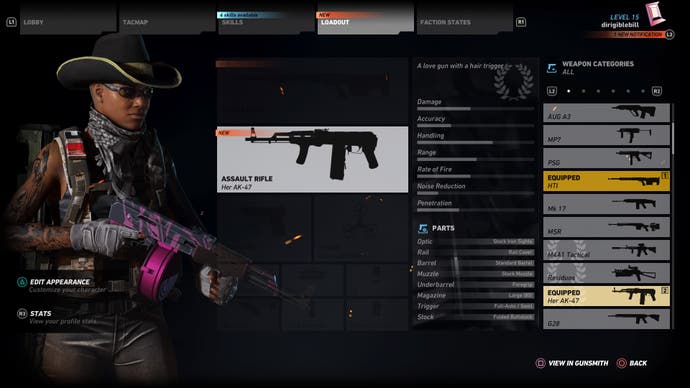
Like many a Tom Clancy story before, Wildlands makes a show of interrogating its obnoxious premise via the odd self-conscious platitude in dialogue - examples include "it feels like we're the bad guys" or that all-time favourite, "there is no easy answer". If there's any genuine ambiguity to be found in the game, however, it quickly evaporates before the all-importance of Getting The Job Done Whatever The Cost. There are also moments of astonishing bleakness. One cluster of missions sees you tracking down the foreign-born operators who trained up Santa Blanca's elite footsoldiers, many of them former US servicemen. In the process, you might hear a comrade express disgust at the idea that any veteran would sink to helping drug-runners wage war. To which the protagonist curtly responds: "Fighters fight, geldings graze. What are you?"
After banter like that, you might relish the thought of signing up a few potty-mouthed online randoms in place of your AI squad - and multiplayer is definitely Ghost Recon's strongest suite, with match-making a button press away everywhere in the world. The game uses peer-to-peer connections rather than dedicated servers, which means you can expect the occasional freeze when a player disconnects; I've also encountered the odd co-op-specific glitch such as a story mission that refused to complete, or a helicopter that flew without animating, as though gripped in the fist of a giant, invisible toddler. For the most part, though, the networking is slick and robust, allowing players to range through the world freely, spawn on each other, share HUD information and form a squad to complete missions.
This essentially leads to two types of experience. Firstly, there's the kind in which everybody has a mic, everybody knows what they're doing, and you tear through missions like throwing knives through bath foam - one player methodically tagging foes from a hilltop while another snipes every last light source and the other two weave through interiors with silenced pistol and SMG, sweeping ankles and collaring VIPs. Somebody's always around to revive you if you're shot down, and when you all pile into a helicopter, you can rest assured that the pilot won't fly straight into a cliff. This side of Wildlands co-op is a subdued waltz of sightlines, go-orders and dignified retreats, of crawling through cornfields in formation and parachuting to pre-agreed vantage points around an airfield.
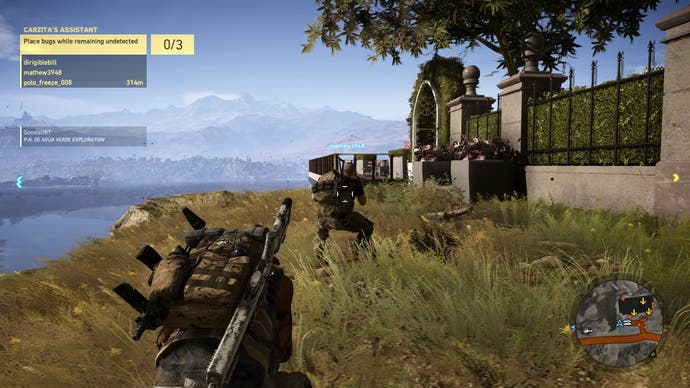
And then there's the other kind of co-op, where you bleed out in a tangled mass of flaming car hulks because the nearest squadmate has decided to re-spec his shotgun in the midst of mortar bombardment, and the other two come hurtling over the ridge in a tractor. Later, you're sneaking up on a mission-critical NPC when a friendly lobs a flashbang at you. Then somebody else decides to create a diversion by getting an eight-wheel APC jammed in a doorway. You fail the mission, needless to say, but that's all fine and dandy, because there's a busy road near the spawn, and nothing washes away the taste of defeat like rolling a milk truck to the bottom of a scenic hillside. It's the choice, in fewer words, between a deft team stealth experience and a giddy open world free-for-all - and a decent fit either way for any Grand Theft Auto Online player looking for a change of air.
It's easier to ignore the game's fundamental toxicity and recycled elements in co-op, but all that's still there at the back of your mind, like the smell of something burning in a crowded room. Earlier in the week I asked whether the Ubisoft open world had run out of steam. After a few days in the Wildlands I think the answer is a hesitant 'no' - few development studios are capable of landscapes as grand yet delicately worked as this, but the methods by which we traverse and uncover them are overdue a rethink, and the concept of a godlike special operator killing without compunction is rotten to the core. Wildlands is an environment worth lingering over, but the mechanics and themes it propagates are wearing extremely thin.
